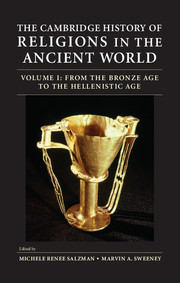Book contents
- Frontmatter
- Contents
- List of Figures and Maps
- List of Contributors
- List of Abbreviations
- Acknowledgments
- Introduction to Volumes I and II
- Introduction to Volume I
- Part I Mesopotamia and the Near East
- Part II Egypt and North Africa
- Part III Greece and the Eastern Mediterranean
- Part IV The Western Mediterranean and Europe
- 12 Etruscan Religion
- 13 Roman Religion through the Early Republic
- 14 Celtic Religion in Western and Central Europe
- Suggestions for Further Reading
- General Index
- Index of Citations
- Frontmatter
- Contents
- List of Figures and Maps
- List of Contributors
- List of Abbreviations
- Introduction to Volume II
- Part I Iran and the Near East
- Part II Egypt and North Africa
- Part III Greece and Asia Minor
- Part IV Italy, Roman Gaul, and Spain
- Suggestions for Further Reading
- General Index
- Index of Citations
- References
13 - Roman Religion through the Early Republic
from Part IV - The Western Mediterranean and Europe
Published online by Cambridge University Press: 05 October 2013
- Frontmatter
- Contents
- List of Figures and Maps
- List of Contributors
- List of Abbreviations
- Acknowledgments
- Introduction to Volumes I and II
- Introduction to Volume I
- Part I Mesopotamia and the Near East
- Part II Egypt and North Africa
- Part III Greece and the Eastern Mediterranean
- Part IV The Western Mediterranean and Europe
- 12 Etruscan Religion
- 13 Roman Religion through the Early Republic
- 14 Celtic Religion in Western and Central Europe
- Suggestions for Further Reading
- General Index
- Index of Citations
- Frontmatter
- Contents
- List of Figures and Maps
- List of Contributors
- List of Abbreviations
- Introduction to Volume II
- Part I Iran and the Near East
- Part II Egypt and North Africa
- Part III Greece and Asia Minor
- Part IV Italy, Roman Gaul, and Spain
- Suggestions for Further Reading
- General Index
- Index of Citations
- References
Summary
If Greek culture is late compared to the city-states and empires of the Ancient Near East, Roman culture is late and peripheral to Greek culture. It entered the international stage by the very end of the sixth century bce, but contemporary literary sources or reliable later accounts are not available before the second half of the third or fourth century bce. By this time, the Romans and their allies’ armies started to build an empire that comprised the whole of the Mediterranean and much of its hinterland, that is, the whole of western Europe including Britain and much of southeastern Europe, including modern Austria, Hungary, Bulgaria, and Romania, and Asia Minor as far as Armenia by the beginning of the second century ce. Rome defended a hostile borderline against the Sassanian Persian empire and influenced political and cultural patterns throughout its realm with lasting effects for two millennia. It is this later history that accounts for an interest in Rome’s origins. But such an interest must be disappointed here. Nothing supports the assumption that any of the religious elements from the period before the fourth century bce should be part of a causal explanation of the later expansion of the city-state into a world empire.
- Type
- Chapter
- Information
- The Cambridge History of Religions in the Ancient World , pp. 336 - 363Publisher: Cambridge University PressPrint publication year: 2013



